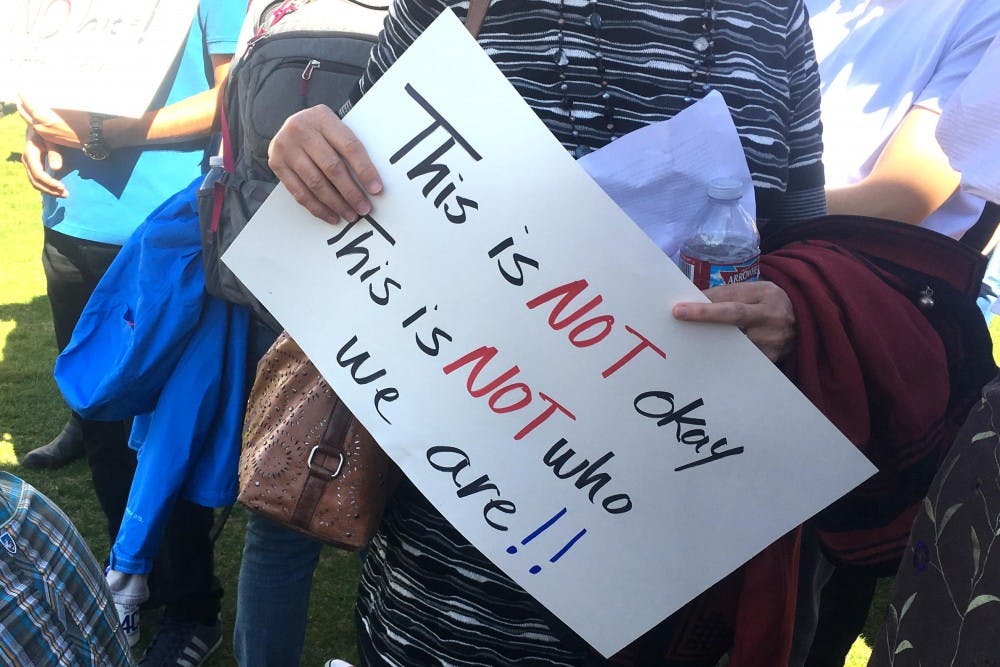U.S. universities are in a difficult situation following President Donald Trump's immigration ban — an executive order that forbids individuals from seven Muslim-majority nations from entering the country.
Although the ban on refugees was recently overturned, the Trump administration fought to reinstate the ban and were met with failure today when the judges of the 9th U.S. Circuit Court of Appeals refused to reinstate the travel ban. Trump did not take too kindly to the decision.
SEE YOU IN COURT, THE SECURITY OF OUR NATION IS AT STAKE!
— Donald J. Trump (@realDonaldTrump) February 9, 2017
International student enrollment in U.S. colleges and universities reached a record high of 975,000 students in the 2014-2015 school year with an estimated 10 percent increase every year. Arizona has more than 270 international students from the seven "banned" countries studying at the state's three public universities with ASU housing almost 200 of them.
ASU's president Michael Crow called the Trump order "ill-conceived and poorly executed public policy" in a report directed at ASU faculty and students. He said that Trump's actions had negative consequences because they cause "confusion and chaos" and are damaging to the mission of higher education.
Additionally, ASU Provost Mark Searle recommended that the students from the seven countries listed in the executive order avoid "travel outside of the country or near border entry checkpoints" in an email sent to students last week.
With the possibility of this ban being reinstated, what can we envision for the future of higher education?
With over 975,000 international students enrolled in U.S. universities seeking to pursue higher education, schools around the country are struggling with what the restrictions mean for their students. By permitting students from different backgrounds and cultures to study at prestigious universities in the U.S., schools are able to accomplish their academic mission of fostering a "melting pot" of ideas, influences and perspectives.
Hugh Mason, associate professor at the Biodesign Institute and College of Liberal Arts and Sciences said he believes any restriction on immigration can suppress the progress of science.
"We need to continue open exchange of ideas and materials, and foreign students contribute greatly to research in the U.S.," Mason said.
Not only could this ban make U.S. universities appear less appealing to prospective applicants, but it also suppresses the progress of education and science.
For international students who attend international scientific conferences, restrictions on travel to and from the U.S. would take a heavy toll on several crucial collaborations with other scientists from around the world.
International Students at ASU from ASU Unscripted on Vimeo.
The recruitment of scientists around the world and international research collaborations would also be much more difficult to organize. Highly-skilled workers and scholars would have to decide between being trapped in the U.S. for an indefinite amount of time or traveling for research-related projects and potentially being denied re-entry.
It is easy to turn the other cheek and remain oblivious to politics that don't impact you directly. For thousands of students in the U.S., education is often perceived as a chore. Rarely do you hear students excited about waking up the following morning to sit in a classroom for eight hours listening to their teacher drone on about bleak subject matter.
But for some students, education is not a chore — it's a privilege.
For children in third-world countries, the opportunity to go to school and obtain an education is a luxury few can afford. It is important to remember that although education may seem tedious at times, there are thousands of people around the world that would love to have the opportunity U.S. students have.
The international students that are fortunate enough to pursue higher education in the U.S. obtained the distinguished opportunity to do so, did it through hard work and immense effort. To deny them re-entry to this country after all the obstacles they strove to overcome, would be a hard slap in the face.
Many of them who wish to pursue higher education in the U.S. do so because the U.S. is known for its extensive academic programs across a variety of disciples. Those who come here wish to achieve their own version of the "American dream."
The contribution of these international students is vital to the advancement of science. Preventing them aiding our society in scientific progress would have a drastic effect on academia. Education is what keeps our country great, and diminishing the efforts of international students not only takes away from their dream, but from the American dream as well.
Correction: A previous version of this article contained an error in the caption of the article's lead photograph. This version has been updated with the corrected information.
Reach the columnist at yasmine.mian@asu.edu or follow @yasminemian on Twitter.
Editor’s note: The opinions presented in this column are the author’s and do not imply any endorsement from The State Press or its editors.
Want to join the conversation? Send an email to opiniondesk.statepress@gmail.com. Keep letters under 300 words and be sure to include your university affiliation. Anonymity will not be granted.
Like The State Press on Facebook and follow @statepress on Twitter.




